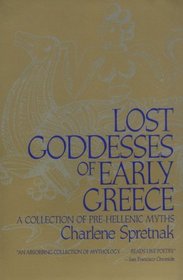These mythic stories draw on early models of empowerment and leave off the misogynistic re-interpretations which became the standards of later retellings. Spretnak is a master storyteller and feminist theorist. This book should be part of every serious feminist's book collection.
Having not yet read much about women's history, this book was a revelation to me. It reveals the truth about the ancient Greek myths, which is that the most popular versions we know today, with a pantheon of Gods headed by Zeus, are actually the product of the conquering patriarchal culture that invaded early Greece. The original ancient Greek culture was a matrifocal one, and its deities were Goddesses.
This book tells the tales of the ancient pre-Zeus Goddesses, as far as we know them today after the invading culture's attempts to erase and blend them with its own pantheon.
A few surprises: Hera was not originally Zeus's wife. She was made his wife as a way of enforcing Greece's subservience to its new masters. Pandora was not the bringer of all bad things, she was the bringer of all GOOD things. And Athena, who was a favourite of the people of Crete, was originally depicted as a patron of the arts, not as a warrior.
It is easy to see where the Christian myth of Eve and the serpent originated when we look at the ancient depictions of Goddesses and priestesses handling snakes (snakes were a symbol of renewal and rebirth). For a conquering patriarchal religion to be able to take hold among a resistant native matrifocal culture requires that the original religion be discredited and proved to be evil and foolish. This is exactly what Christianity did to the ancient Goddess-worshiping religions, by transforming the wise and powerful Goddess with her symbolic snake into a sinful, weak being of no worth, who could be swayed by the evil whisperings of a foul serpent, Eve. It is Eve who has the curiosity to learn about the world, and she is shown handing down her knowledge to Adam, but that is the only remnant of positivity about women that remains in the Christian myth.
Even Mother Mary is an adaptation of the early Goddesses, who were depicted as becoming spontaneously pregnant, without the need for a partner. The presence of a divine female, Mary, in the Christian mythos would have made it much easier for early people, who were accustomed to worshipping the Mother Goddess, to convert to the new religion.
This is a fascinating book that any lover of ancient myths and tales will treasure, as will anyone who wants deeper knowledge of human history (or herstory, as the case may be), including the history that conquerors have attempted to erase or suppress.
This book tells the tales of the ancient pre-Zeus Goddesses, as far as we know them today after the invading culture's attempts to erase and blend them with its own pantheon.
A few surprises: Hera was not originally Zeus's wife. She was made his wife as a way of enforcing Greece's subservience to its new masters. Pandora was not the bringer of all bad things, she was the bringer of all GOOD things. And Athena, who was a favourite of the people of Crete, was originally depicted as a patron of the arts, not as a warrior.
It is easy to see where the Christian myth of Eve and the serpent originated when we look at the ancient depictions of Goddesses and priestesses handling snakes (snakes were a symbol of renewal and rebirth). For a conquering patriarchal religion to be able to take hold among a resistant native matrifocal culture requires that the original religion be discredited and proved to be evil and foolish. This is exactly what Christianity did to the ancient Goddess-worshiping religions, by transforming the wise and powerful Goddess with her symbolic snake into a sinful, weak being of no worth, who could be swayed by the evil whisperings of a foul serpent, Eve. It is Eve who has the curiosity to learn about the world, and she is shown handing down her knowledge to Adam, but that is the only remnant of positivity about women that remains in the Christian myth.
Even Mother Mary is an adaptation of the early Goddesses, who were depicted as becoming spontaneously pregnant, without the need for a partner. The presence of a divine female, Mary, in the Christian mythos would have made it much easier for early people, who were accustomed to worshipping the Mother Goddess, to convert to the new religion.
This is a fascinating book that any lover of ancient myths and tales will treasure, as will anyone who wants deeper knowledge of human history (or herstory, as the case may be), including the history that conquerors have attempted to erase or suppress.




![header=[] body=[Get a free book credit right now by joining the club and listing 5 books you have and are willing to share with other members!] Help icon](/images/question.gif?v=90afaeb39)
